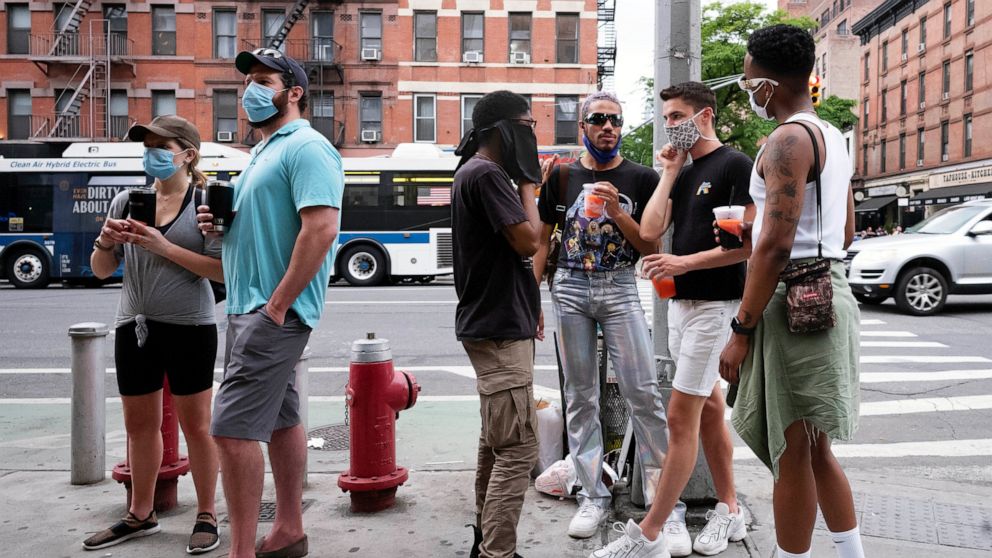Hochul rallies support for to-go sales of cocktails
New Yorkers could again buy takeout cocktails at restaurants and bars under a proposal Gov. Kathy Hochul boosted Wednesday, though state regulators could end up limiting how much alcohol patrons could buy and when.
Restaurant and bar owners have urged Hochul to reinstitute the sale of to-go alcoholic drinks, which the state temporarily authorized at the pandemic’s onset. The policy proved popular with customers, but ended in late June 2021.
Hochul included the permanent legalization of takeout alcoholic beverages in her proposed budget, which she’s finalizing with lawmakers this month. If passed, the public would have a chance to comment on regulations for takeout sales.
“Yes, there has been opposition in the past, but I’m willing to take it to the people,” Hochul said. “You’ve heard from the businesses, we heard from consumers. And I believe that we’re making a very strong case to get this passed.
Customers can still purchase some drinks to-go: New York has allowed takeout sales of beer since the end of Prohibition, and restaurants can also sell partially consumed bottles of wine to-go.
But Hochul’s proposal could add more alcoholic beverages like cocktails and bottles of wine, and allow state liquor regulators to limit the volume and quantity of drinks that restaurants and bars could sell. State regulators could also limit the time of day for takeout sales and require them to seal open beverages.
New York’s previous to-go policy required customers to also purchase food, but Hochul suggested that’s no longer necessary. “I don’t believe it will be necessary to have food associated with it,” she said.
New York’s to-go policy also allowed restaurants to sell bottles of liquor, drawing complaints from liquor store owners.
Empire State Restaurant and Tavern Association Executive Director Scott Scott Wexler said the practice wasn’t widespread.
Liquor store owners, and industry lobbyists, have for months pushed lawmakers to preserve pre-pandemic restrictions on to-go sales.
Such critics have claimed that proposals to resume to-go sales would cut into liquor stores’ profits, and fuel bad behavior from more drunk driving to public urination.
Stefan Kalogridis, board president of the state liquor store association, has argued the state lacks the manpower to ensure restaurants aren’t acting like liquor stores, which face tight restrictions including limited hours to sell alcohol.
Kalogridis told the Albany Times Union newspaper last March that his association would support a law allowing takeout cocktails and individual servings of wine.
Lawmakers failed to pass such a bill last year following intense lobbying by liquor store owners.
this February, the New York State Liquor Store Association released a statement to WHAM-TV saying it’s “against bringing back takeout cocktails.”
Kalogridis’ association didn’t immediately respond to request for comment Wednesday.
Wexler, of the restaurant and tavern industry, says the liquor store lobby is fear-mongering and pressuring lawmakers fearful of hurting any small business.
“The liquor stores have great emotion and they evoke great sympathy, but there are no facts to support their argument,” Wexler said.
Wexler said liquor stores sell 85% of all wine and liquor in the state.
Hochul spokesperson Hazel Crampton-Hays said regulators will decide whether to allow to-go sales of bottles of alcohol again.
Wexler said his association appreciates Hochul’s approach of leaving specifics to regulators, but said restaurant and bar owners could live with a ban on takeout sales of bottles of whiskey or vodka.
“We are fighting for bottles of wine, we’re not fighting for bottles of liquor,” said Wexler, who said the goal is recreating the dine-in experience.
Andrew Rigie, executive director of the NYC Hospitality Alliance, said to-go drinks have provided “struggling businesses an important revenue stream while giving New Yorkers what they want.”
New York’s restaurants, bars and fast food establishments averaged about 575,000 employees from July to September, according to the latest state labor data. That’s down from roughly 690,000 in that time period in 2019.
Local laws prohibiting open containers of alcohol in public are widespread in New York.
Manhattan decriminalized public drinking in 2016, though individuals can still face a summons or fine. Sen. Julia Salazar, a Democrat representing parts of Brooklyn, is sponsoring a bill to allow for consumption of alcohol in public places besides cars.
![]()


